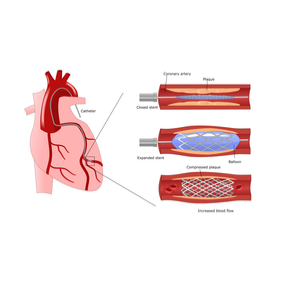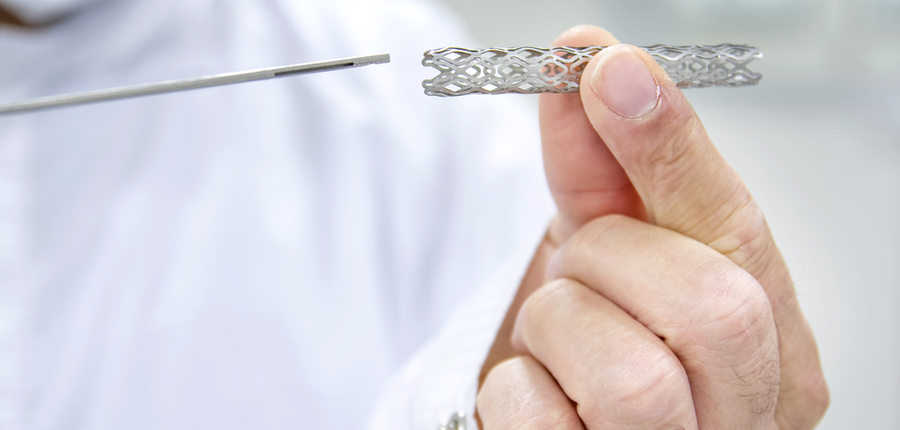
Smoking ‘til your lungs explodes, drinking like there’s no tomorrow, and too much junk food. These are the perfect recipe for a disaster.
You can have the time of your life while you are young. But when you have pushed your body to the limit, chances are, it will self-destruct and haunt you for the rest of your life.
Cholesterol and plaque buildups in your arteries are the major cause of heart attack and stroke. These happen when you have too much of them causing the tightening and eventually total blockage or rupture.
When this happens, consider yourself like a ticking time bomb waiting to explode anytime. But consider yourself lucky if these blockages have been detected soon enough before a major catastrophe happens.
Angioplasty is a procedure that may save your life if you have a coronary artery disease. This is done by unblocking your artery and thereby re-establishing normal blood flow to the heart. And most of the time, a stent may be used, which is a tiny, expandable, mesh-like tube used in opening up narrowed arteries.
Sounds overwhelming? Let us see if the heart stent price may evoke the same reaction.

Average Cost of Heart Stent
The angioplasty stent costs around $15,000 up to $50,000, with a national average of about $28,000 to $30,000, depending on several factors like the hospital where the procedure is performed, the type of stent used, among others.
Additional Expenses
In non-emergency cases, a thorough consultation is necessary prior to deciding to undergo any medical procedure, be it invasive or non-invasive. This is to determine whether you really need it or not. A trip to your cardiologist may cost around $200 to $400.
Several diagnostics test may be required to check your exact condition. These may include the following:
- Chest X-ray – $200 to $400
- Electrocardiogram (EKG) – $400 to $500
- Stress Test – $1,000
- Blood tests – Troponin tests $45 to $95, Lipid profile $50 to $100
- Magnetic Resonance Imaging (MRI) – $1,000 to $5,000
- Angiogram – $5,000 to $10,000
- Cardiac Calcium Scoring – $99 to $399
- Nuclear Stress Test – $4,000 or more
Aftercare is also important when you have undergone any heart procedure. Some of these may include the following:
- Cardiac rehabilitation – $150 to $300 per session
- Medications – may include Aspirin, Clopidogrel, Prasugrel, Ticagrelor, or Ticlopidine
Shopping for Heart Stent
Most modern hospitals have cath labs where they could perform these procedures so you could check any of the hospitals near your area to inquire. You may also search various hospitals online specializing in heart procedures and surgeries through this link.
Factors Affecting Heart Stent Prices
Like any other expenditures, a lot of factors could affect the cost. But unlike the construction of a house that you can estimate the exact cost prior to putting up the structure, the angioplasty, along with any other medical procedure especially of the heart, the exact cost may be difficult to determine until the actual procedure has been performed.
Having said that, below are the different factors that would determine the ultimate heart stent price:
- Demand – the cost of angioplasty is particularly higher in areas where the demand for such services is high. One indication of high demand is when there is a lengthy waiting list in order to be operated on.
- The hospital – the rate of the hospitals for each state, cities, and counties, across the country vary due to cost of living and cost of doing business. Also, some hospitals have more state of the art and latest models of equipment compared to others.
- The number of stents required – the number of stents you will be needing will affect the overall cost of the procedure as each stent may cost several thousand dollars.
- The type of stent used – there are some types of stents that are more costly than others. Some of the more expensive types are the drug-eluting stents (DES) or the bioresorbable vascular scaffolds (BVS).
- If you need a stent at all or not – there can be cases where a permanent stent may not be needed at all. In this case, your hospital bill may be considerably lower compared to having to place a stent in your artery.
- Type of angioplasty technique – different types of techniques during the procedure may be performed by the doctor depending on the condition of the patient. Several options include balloon angioplasty which is the most widely-used. Other methods like atherectomy or rotablation may also be an alternative.
- The severity of the condition – the level and number of your blockage affects how long the procedure is to be performed and how many stents will be used.
- The doctor – the level of expertise and the experience of your cardiologist most of the time is a factor in the cost of the procedure, especially if the said doctor is very sought-after in their field.
- Urgency – the more you need the procedure performed on you is an indication that your condition is more life-threatening, which therefore may entail more cost due to additional treatments like being treated in the emergency room.
- Insurance – more likely that your insurance would decline any claim relating to angioplasty when it is done as a precautionary measure. Meaning, for the insurance to cover this procedure, it should be deemed life-threatening, like an occurrence of a heart attack. But there are some good insurance companies that may cover it partially so it is better to discuss the coverage thoroughly with your insurance provider.
- Cash payments – some hospitals provide a discount ranging from 10% to 35% of the cost for uninsured patients.
If you have more time to decide like if it is not an emergency situation, it is important to discuss the costs including all the possible scenarios that might happen during the procedure. This way, you will be able to either prepare for the budget and not have a heart attack because of your bill, or you may be able to negotiate or even ask for a discount.
Also, lifestyle change is as important if you decide to prolong your life. Sure enough, there are remedies in the medical field that can you can turn to if worse comes to worst. But they can only do so much. That is if you can still make it to the hospital alive. Your decision to do something about your condition may still be the best option.